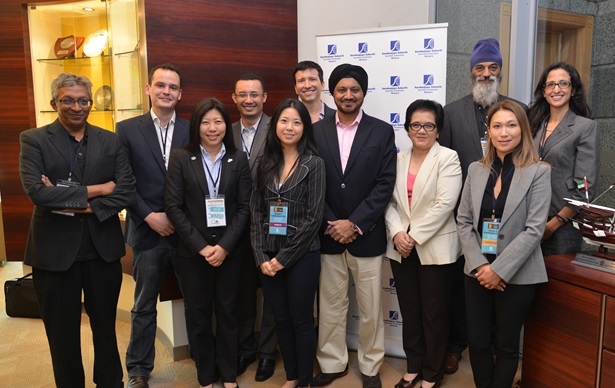Investor confidence critical for equity crowdfunding: SC chairman
By A. Asohan September 22, 2014
- Commission believes in strong investor education outreach programme
- ECF will aid in democratisation of wealth and ideas across entire economy

THE equity crowdfunding platform that the Securities Commission Malaysia (SC) is proposing will depend heavily on investor confidence, its chairman Ranjit Ajit Singh acknowledged.
“Having a strong investor education outreach programme, investors’ alerts, interactive tools and educational content to help investors make informed financial decisions will be a key component moving forward.
“We have continuously emphasised this aspect of investor awareness and in fact only last week successfully concluded the inaugural InvestSmart Fest together with 37 of our industry players … to raise public awareness on investing in the capital market,” he told about 500 participants at the SC’s Synergy and Crowdfunding Forum (SCxSC) on Sept 19.
On Aug 21 [date corrected], the SC published a consultation paper seeking public feedback on its proposed regulatory framework for equity crowdfunding (ECF).
This new platform would allow startups or other smaller enterprises to obtain capital through small equity investments from relatively large numbers of investors, using online portals to publicise and facilitate offers to crowd investors, the Commission said then.
SCxSC, organised by the SC with the Malaysian Business Angel Network (MBAN) from Sept 19-20, featured notable thought leaders in crowdfunding, including Jason Best who was instrumental in co-authoring the crowdfunding investment framework to legalise equity crowdfunding in the United States, as well as regional business leaders in the startup arena.
[Disclosure: Digital News Asia (DNA) chief executive officer Karamjit Singh as well as the writer moderated two different panel discussions at the event].
In response to further queries by DNA after the public consultation period, sources familiar with the matter said the ECF platform could be up and running as early as the first half of 2015, depending on Parliament approving the required legislative amendments.
The SC believes that leveraging on the power of crowdfunding will assist in the democratisation of wealth, prosperity and ideas across the entire economy, thereby strengthening the inclusiveness of finance, said Ranjit.
“Technology and innovation have the potential to unlock value and opportunities that will raise productivity and growth.
“Two areas of financial innovation using disruptive technologies that have seen strong growth in recent years are peer-to-peer lending and equity crowdfunding.
“Regulators view such alternative online venues as a viable market based financing and investment option, providing a means to not only seek funding but to also ‘crowdsource’ ideas and innovations for underserved segments within the real economy,” he said in his opening speech at SCxSC.
An ongoing complaint in Malaysia’s startup scene is the lack of deal flows and what many players sees as a funding gap. The SC believes an ECF market could plug this gap somewhat.
“High-growth ventures typically seek support in the form of equity and expertise from angels or venture capitalists,” said Ranjit.
“However, these customary sources of early funding may not always be ideal. As such a more sustainable funding mode to bridge the capital gap is needed. Equity crowdfunding lets investors ‘get in on the deal,’ allowing everyone who understands the risks to have the opportunity to invest in early stage companies,” he added.
Ranjit noted that crowdfunding will remain a relatively small part of the wider equity and debt capital markets.
“It is still, in our view, an important channel for capital formation that will have a profound impact on the financial landscape,” he added however.
Meanwhile equity crowdfunding expert Best, in his keynote address at SCxSC, said four components needed to be in place for such a platform to succeed.
“You’d need an entrepreneurial culture, community engagement, a technology platform and a regulatory framework,” he said, commending the SC for “planting a flag” in this regard with its proposed framework.
“You also need trust and relationships – investors must be confident that entrepreneurs will go out and do what they say they’re going to do,” he added.
Cradle Fund Sdn Bhd chief executive officer Nazrin Hassan, who was a panellist at the first discussion, said that one suggestion would be to open up the ECF market to ‘sophisticated investors,’ that is those with experience and financial markets knowhow.
“This will help build confidence in the platform before it can be opened up to the masses,” he said, adding that getting well-known venture capitalists and angel investors to lead the way would be key.
“If someone famous and known for flipping was to invest, say RM500,000 of his own money into a venture, then the ‘crowd’ will definitely be more confident in investing in the venture too,” Nazrin said.
The first day of the forum attracted investors, angels, entrepreneurs, startups, academics and students, while the second day featured workshops for investors and entrepreneurs.
SCxSC strategic partners included The Edge Malaysia, Cradle, Multimedia Development Corporation (MDeC), pitchIN, Crowdonomic and StartupMalaysia.org.
Related Stories:
Equity crowdfunding: The good, and not so good
SC seeks feedback on equity crowdfunding regulations
Disrupt: More success stories needed to plug funding gap
Crowdsourcing: It’s about disruptive business models
For more technology news and the latest updates, follow us on Twitter, LinkedIn or Like us on Facebook.


